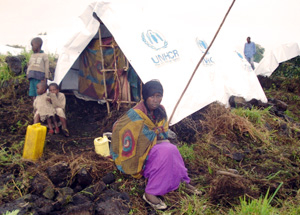
Chantal Lumoo and her children in the Mugunga Camp , West of Goma
Credits: Taylor Kakala/Caritas Goma
“I came to the camp looking for safety from the rebels,” said Chantal, a 32 year old mother who is now living with her six children in Mugunga camp in North Kivu, in the east of the Democratic Republic of Congo.
She reached the camp after travelling 60km from her home in Masisi. Her family escaped Masisi safely after it was attacked by ‘M23’ rebels. Jacques Mouhindo, another camp resident also from Massisi, wasn’t so lucky. His infant son was injured by a stray bullet while they fled, but thankfully survived.
Mugunga camp is home to about 27,000 people. It is just one of the 40 camps that dot this part of Congo. Over a quarter of a million people have been forced from their homes since the M23 rebellion began in April.
Chantal says life in the camp is difficult for her family. They’ve been there for six months. “I’m facing starvation,” she says. Caritas has provided her some food but aid appeals for Congo are underfunded. Of the US$791 million requested by the UN for the DRC in 2012, only 56 percent has been funded so far. Insecurity and poor transport conditions add to the challenges. Aid workers report it can take up to 11 days to travel 250 km in North Kivu.
“Humanitarian aid is scarce. Famine is feared in this camp where children are already vulnerable. We record two deaths per week due to malnutrition and cholera,” said Claude Ntigulirwa, secretary of Mugunga camp.
Chantal sits on the floor of her hut. It is covered with a plastic tarpaulin from the UN refugee agency UNHCR. Like the two million people forced from their homes in the Congo, she is just trying to survive. She has never really known peace her whole life. She was born under the kleptocratic dictatorship of Mobutu Sesse Seko. When his regime collapsed in the 1990’s, the east was thrown into a never ending cycle of conflict.
The current president Joseph Kabila won disputed elections last year and his government remains weak in the east. The spark for the current fighting appears to have been when he ordered the arrest an ex-militia leader, Bosco Ntaganda, who is wanted by the International Criminal Court (ICC) for war crimes.
The ‘M23’ name alludes to a peace agreement signed on 23 March 2009 with the government. Bosco Ntaganda and 300 fighters loyal to him abandoned the deal after the warrant was issued. On 20 November they seized Goma, a city of one million inhabitants.
Unfortunately, the M23 is not an exception in a country where dozens of militias and army soldiers participate in human rights violations against the civilian population.
Caritas Goma’s Taylor Kakala says the reality is bleak. “Young men, the military, police and the militias carry out abuses against women, even children,” he says. “This is helped by an environment of impunity despite a law against sexual violence (in 2006).”
The numbers are staggering: 2517 persons were raped in North Kivu between January and June 2012. Of these, 2,339 are women and 178 are men. Children raped totals 745. The youngest victim was two years old.
“The endless conflict has robbed people of their moral compass,” said Taylor Kakala. “They view rape as entertainment.”
At a press conference on November 14 in Rome, Jesuit Refugee Service said, “In addition to the immediate consequences of the violence, the attacks leave many groups – women, children, older people, those with disabilities and health problems – in particularly vulnerable circumstances, without assistance from aid agencies and support from other community members.”
The great strength of Caritas Congo is its presence in the country. Caritas has been in Congo for more than 50 years. The national office coordinates the activities of 47 diocesan Caritas partners. The latter works with 1500 parishes. This presence in the country is important in an emergency.
Goma has 25 parishes and 25 offices that assist the population. Caritas works with local and international partners in order to strengthen their efforts. In the case of Mugunga camp, Caritas distributed food aid provided by the UN’s food agency WFP.
Thousands of Congolese still manage to function in this chaos. Motivated by a strong will to survive, combined with incredible resilience. Chantal says, “As we have not received food, I have to look for firewood, food and water myself. We, the women of the camp, cultivate fields or work as housekeepers. All for 500 francs (USD $ 0.5) just to eat dinner.”
